英语中however的用法
however的用法总结
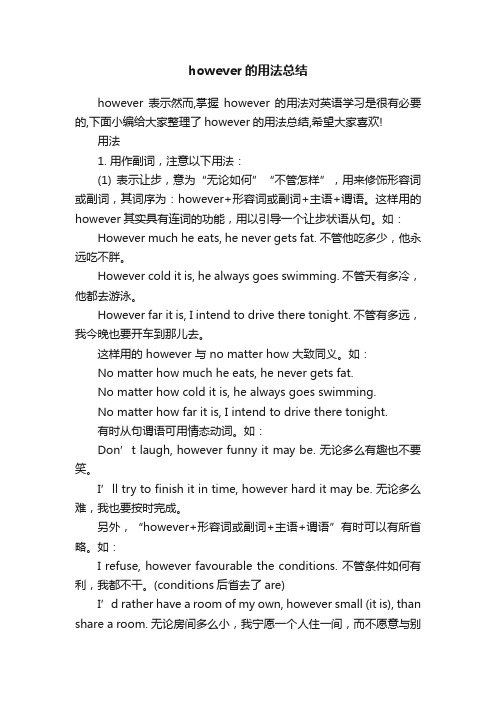
however的用法总结however表示然而,掌握however的用法对英语学习是很有必要的,下面小编给大家整理了however的用法总结,希望大家喜欢!用法1. 用作副词,注意以下用法:(1) 表示让步,意为“无论如何”“不管怎样”,用来修饰形容词或副词,其词序为:however+形容词或副词+主语+谓语。
这样用的however其实具有连词的功能,用以引导一个让步状语从句。
如:However much he eats, he never gets fat. 不管他吃多少,他永远吃不胖。
However cold it is, he always goes swimming. 不管天有多冷,他都去游泳。
However far it is, I intend to drive there tonight. 不管有多远,我今晚也要开车到那儿去。
这样用的 however 与 no matter how 大致同义。
如:No matter how much he eats, he never gets fat.No matter how cold it is, he always goes swimming.No matter how far it is, I intend to drive there tonight.有时从句谓语可用情态动词。
如:Don’t laugh, however funny it may be. 无论多么有趣也不要笑。
I’ll try to finish it in time, however ha rd it may be. 无论多么难,我也要按时完成。
另外,“however+形容词或副词+主语+谓语”有时可以有所省略。
如:I refuse, however favourable the conditions. 不管条件如何有利,我都不干。
(conditions后省去了are)I’d rather have a room of my own, however small (it is), than share a room. 无论房间多么小,我宁愿一个人住一间,而不愿意与别人合住一个房间。
however的让步状语从句

however的让步状语从句however是表示转折的单词,在英语里的使用频率非常高,那么however的让步状语从句是什么样的呢?下面是店铺为你整理的however的让步状语从句,希望大家喜欢!however的让步状语从句howeveradv.不管到什么程度; 无论如何; 然而; 可是conj.不管怎样;however引导让步状语从句后面加形容词或副词引导让步状语从句时 however 本身是副词后面可以跟形容词或副词但也可以不跟直接修饰动词如跟形容词however hard it may be ,do your best.无论多么艰难总要尽你的力量去做.跟副词however hard he worked ,he didn't pass the exam .无论他多么努力他还是考试不及格不跟however he worked ,he didn't satisfy his boss .无论他怎么干老板都不满意.however的例句1. The mechanics of the job, however, have changed little since then.不过,工作流程从那以后就几乎没有任何变化。
2. The deal with Chelsea may not, however, be dead.不过,与切尔西的交易或许还有戏。
3. What is missing, however, is an internal, artistic cohesion.不过,缺乏的是一种内在的艺术凝聚力。
4. However, many customers found the smell of this product distinctly off-putting.然而,很多顾客觉得该产品有一股异味,非常难闻。
5. When angry or excited, however, he could be wild, profane,and terrifying.但愤怒或激动的时候,他也会发狂、会骂人、令人生畏。
表转折的英语连词

表转折的英语连词1800字以下列举了常用的表转折的英语连词及其用法。
1. butbut常用于表示转折、对比或限制。
一般用于两个相对的观点或想法之间。
例如:- She is beautiful, but she is also very smart.(她很漂亮,但她也非常聪明。
)- I wanted to go to the concert, but I didn't have enough money.(我想去听音乐会,但是我没有足够的钱。
)- This restaurant is popular, but the service is not very good.(这家餐厅很受欢迎,但服务不太好。
)2. howeverhowever通常用于两个相对的事物之间,表示一种转折或对比。
它的用法和but很相似,但是however的语气更强,表示对前面所说的事情的强调。
例如:- The food was good; however, the service was slow.(食物不错,但是服务比较慢。
)- She is very outgoing; however, she can also be a bit shy.(她很外向,但有时也会有点害羞。
)- I accidently deleted all my files; however, I was able to recover them later.(我不小心删除了所有的文件,但是后来我可以恢复它们。
)3. althoughalthough通常用来引出一个事实,并且这个事实看起来和后面说的事情不相符,表示转折的关系。
例如:- Although it was raining, he didn't bring an umbrella.(虽然下雨了,但他没带伞。
)- Although she is allergic to cats, she has three of them at home.(虽然她对猫过敏,但她家里有三只猫。
however的用法及例句

however的用法及例句How to use "however"1. Contrast.Use "however" to introduce a contrasting idea or statement. It can be used to show that the following information is different from or contradicts what has been said before.Example:I love to go to the beach. However, I hate getting sunburned.She's very intelligent. However, she's not always good at expressing herself.2. Concession.Use "however" to acknowledge or admit something that is true, even though it may not be favorable to your argument. It can be used to make your argument more nuanced and balanced.Example:I don't agree with his political views. However, I respect his right to have them.The movie was not well-received by critics. However, it was a commercial success.3. Exception.Use "however" to introduce an exception to a general rule or statement. It can be used to show that there are certain conditions under which the rule does not apply.Example:You must be 18 years old to vote. However, there aresome exceptions for emancipated minors.All dogs are mammals. However, the platypus is an exception.4. Emphasis.Use "however" to emphasize a point or to make it stand out from the rest of the sentence. It can be used to give the following information more weight or importance.Example:I've been working hard all week. However, I'm still not finished.She's a very talented singer. However, she's also a great songwriter.5. Transition.Use "however" as a transition word to connect two ideasor sentences. It can be used to show that the following information is related to but different from what has been said before.Example:I'm going to the store to buy some groceries. However, I'm not sure what I'm going to make for dinner.The weather forecast is calling for rain. However, I'm hoping it will hold off until after the picnic.Chinese.“however” 的用法。
however句末
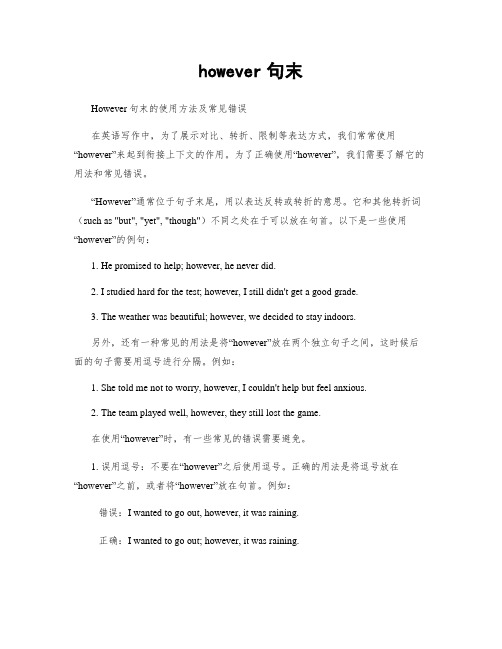
however句末However句末的使用方法及常见错误在英语写作中,为了展示对比、转折、限制等表达方式,我们常常使用“however”来起到衔接上下文的作用。
为了正确使用“however”,我们需要了解它的用法和常见错误。
“However”通常位于句子末尾,用以表达反转或转折的意思。
它和其他转折词(such as "but", "yet", "though")不同之处在于可以放在句首。
以下是一些使用“however”的例句:1. He promised to help; however, he never did.2. I studied hard for the test; however, I still didn't get a good grade.3. The weather was beautiful; however, we decided to stay indoors.另外,还有一种常见的用法是将“however”放在两个独立句子之间,这时候后面的句子需要用逗号进行分隔。
例如:1. She told me not to worry, however, I couldn't help but feel anxious.2. The team played well, however, they still lost the game.在使用“however”时,有一些常见的错误需要避免。
1. 误用逗号:不要在“however”之后使用逗号。
正确的用法是将逗号放在“however”之前,或者将“however”放在句首。
例如:错误:I wanted to go out, however, it was raining.正确:I wanted to go out; however, it was raining.2. 与“but”混淆:不要将“however”和“but”混淆使用,尤其是在同一个句子中。
常用英语连词用法
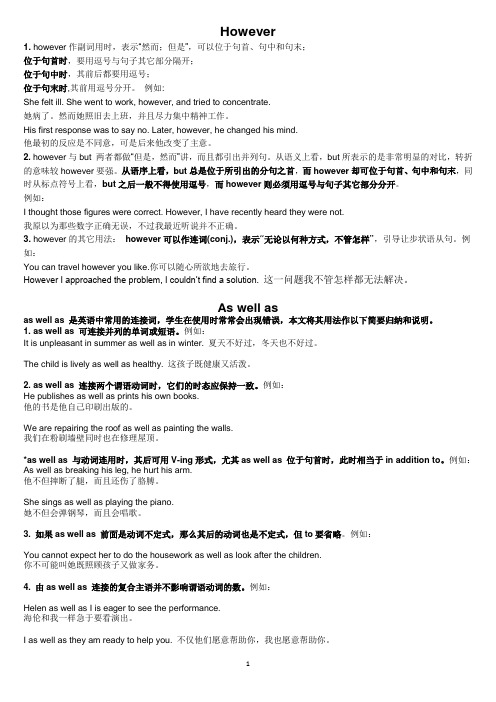
However1. however作副词用时,表示“然而;但是”,可以位于句首、句中和句末;位于句首时,要用逗号与句子其它部分隔开;位于句中时,其前后都要用逗号;位于句末时,其前用逗号分开。
例如:She felt ill. She went to work, however, and tried to concentrate.她病了。
然而她照旧去上班,并且尽力集中精神工作。
His first response was to say no. Later, however, he changed his mind.他最初的反应是不同意,可是后来他改变了主意。
2. however与but 两者都做“但是,然而”讲,而且都引出并列句。
从语义上看,but所表示的是非常明显的对比,转折的意味较however要强。
从语序上看,but总是位于所引出的分句之首,而however却可位于句首、句中和句末,同时从标点符号上看,but之后一般不得使用逗号,而however则必须用逗号与句子其它部分分开。
例如:I thought those figures were correct. However, I have recently heard they were not.我原以为那些数字正确无误,不过我最近听说并不正确。
3. however的其它用法:however可以作连词(conj.),表示“无论以何种方式,不管怎样”,引导让步状语从句。
例如:You can travel however you like.你可以随心所欲地去旅行。
However I approached the problem, I couldn’t find a solution. 这一问题我不管怎样都无法解决。
As well asas well as 是英语中常用的连接词,学生在使用时常常会出现错误,本文将其用法作以下简要归纳和说明。
1. as well as 可连接并列的单词或短语。
whatever,whoever,whichever,whenever,wherever, however用法归纳
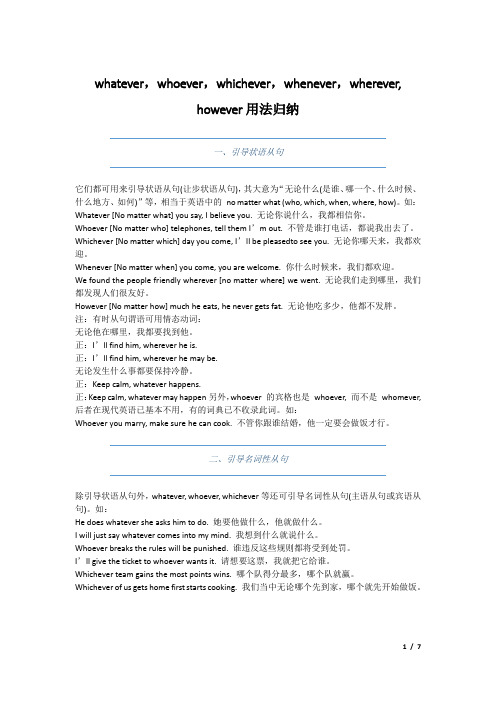
whatever,whoever,whichever,whenever,wherever,however用法归纳一、引导状语从句它们都可用来引导状语从句(让步状语从句),其大意为“无论什么(是谁、哪一个、什么时候、什么地方、如何)”等,相当于英语中的no matter what (who, which, when, where, how)。
如:Whatever [No matter what] you say, I believe you. 无论你说什么,我都相信你。
Whoever [No matter who] telephones, tell them I’m out. 不管是谁打电话,都说我出去了。
Whichever [No matter which] day you come, I’ll be pleasedto see you. 无论你哪天来,我都欢迎。
Whenever [No matter when] you come, you are welcome. 你什么时候来,我们都欢迎。
We found the people friendly wherever [no matter where] we went. 无论我们走到哪里,我们都发现人们很友好。
However [No matter how] much he eats, he never gets fat. 无论他吃多少,他都不发胖。
注:有时从句谓语可用情态动词:无论他在哪里,我都要找到他。
正:I’ll find him, wherever he is.正:I’ll find him, wherever he may be.无论发生什么事都要保持冷静。
正:Keep calm, whatever happens.正:Keep calm, whatever may happen另外,whoever 的宾格也是whoever, 而不是whomever, 后者在现代英语已基本不用,有的词典已不收录此词。
however放句首的用法
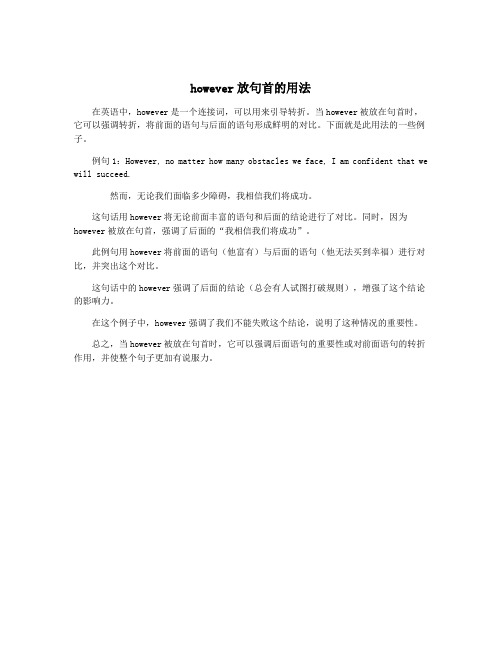
however放句首的用法
在英语中,however是一个连接词,可以用来引导转折。
当however被放在句首时,它可以强调转折,将前面的语句与后面的语句形成鲜明的对比。
下面就是此用法的一些例子。
例句1:However, no matter how many obstacles we face, I am confident that we will succeed.
然而,无论我们面临多少障碍,我相信我们将成功。
这句话用however将无论前面丰富的语句和后面的结论进行了对比。
同时,因为however被放在句首,强调了后面的“我相信我们将成功”。
此例句用however将前面的语句(他富有)与后面的语句(他无法买到幸福)进行对比,并突出这个对比。
这句话中的however强调了后面的结论(总会有人试图打破规则),增强了这个结论的影响力。
在这个例子中,however强调了我们不能失败这个结论,说明了这种情况的重要性。
总之,当however被放在句首时,它可以强调后面语句的重要性或对前面语句的转折作用,并使整个句子更加有说服力。
- 1、下载文档前请自行甄别文档内容的完整性,平台不提供额外的编辑、内容补充、找答案等附加服务。
- 2、"仅部分预览"的文档,不可在线预览部分如存在完整性等问题,可反馈申请退款(可完整预览的文档不适用该条件!)。
- 3、如文档侵犯您的权益,请联系客服反馈,我们会尽快为您处理(人工客服工作时间:9:00-18:30)。
英语中however的用法
1. 表示“在……期间”,是介词,不要将其误用作连词。
如:
他在巴黎期间,与他的朋友住在一起。
误:During he was in Paris, he lived with his friends.
正:While he was in Paris, he lived with his friends.
正:During his stay in Paris, he lived with his friends.
2. during 和for 均可表示一段时间,但两者有差别。
(1) during 通常表示事件发生在何时(when),而for则表示事件持续了多长时间(how long)。
如:
He was in hospital for six weeks during the summer. 他在夏天住了6 个星期的医院。
(2) 两者之后均可接由the whole 引起的时间短语,但通常不能接由all 引起的时间短语。
如:
他整个夏天都住在那儿。
正:He stayed there for [during] the whole summer.
误:He stayed there for [during] all the summer.
(3) 在“数词+时间名词”之前以及在some time, a long time之类表示泛指一段时间的词组之前,可用介词for,但不用during。
如:
He lived here for ten years (for some time). 他在这儿住过10 年(一段时间)。
3. during与in均可表示“时间点”,有时可互换。
如:
I'll be on holiday in [during] August. 我将在8月度假。
He woke up three times in [during] the night. 夜里他醒了3 次。
但在使用时还有以下几点要注意:
(1) 比较而言,during 更强调时间的延续,in 只是指一般性的某一时间。
因此若表示状态或习惯性动作,多用during,否则以用in为常见。
如:
Many people suffered hardship during the war. 许多人在战争期间受苦遭难。
He was injured in the war. 他在战争期间受了伤。
(2) 在stay, visit, meal等表示行为要持续一段时间的名词之前,只能用during 而不能用in。
如:
The phone rang during the meal. 吃饭时电话铃响了。
I went to see my aunt during my stay in Beijing. 在北京逗留期间,我去看了我的姑妈。
(3) 与季节名词连用,in表泛指,during表特指。
如:
In summer we often camp in the forest. 夏天我们常在森林里露营。
(泛指)
During the summer we camped in the forest. 今年夏天我们在森林里露营。
(特指)。
